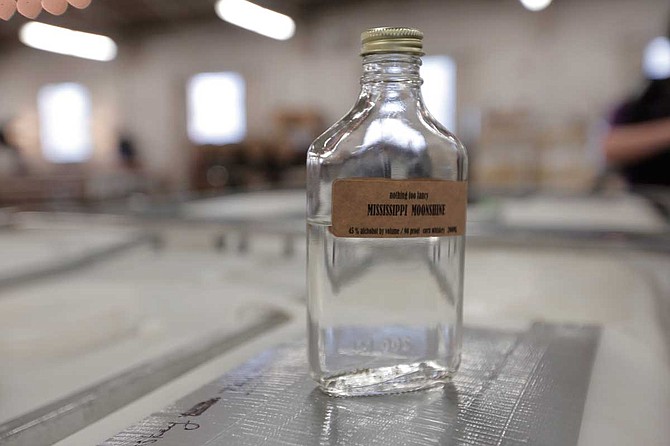Tony Schnadelbach, a curator of interpretation at the Two Museums, said legal microdistilleries are currently operating in several Mississippi cities, including Canton, Oxford and Natchez. The Cathead Distillery in Jackson is fully operational and sells its gin, vodka and bourbon at liquor stores and bars across the state. Photo by Imani Khayyam
JACKSON, Miss. (AP) — Leflore County's bootlegging history will play a role in a new museum exhibit highlighting prohibition, moonshine and illegal distilleries in Mississippi.
A team from the state Department of Archives and History's Two Mississippi Museums (the Museum of Mississippi History and the Mississippi Civil Rights Museum, side-by-side along North Street in Jackson) visited the Museum of the Mississippi Delta on Thursday (July 18) and pulled an old bootlegger's still from a storage container. They loaded it in parts into two vans before heading off to the Crystal Grill for lunch and then the trip home.
The still, and a 36-foot dugout canoe used by a local bootlegger to distribute his elixirs, will become part of an exhibit titled "Mississippi Distilled: Prohibition, Piety and Politics," which will run from March through October of next year.
Leflore County Sheriff Ricky Banks remembered the still being seized in 1973 or 1974 from an abandoned house on the shores of McIntyre Lake, along County Road 532 north of Money. At the time, Banks was chief deputy and Rufus Freeman was sheriff. Banks said the room where the still sat was filled with cottonseed hulls that acted as insulation to keep the process hot as the alcohol distilled.
The McIntyre Lake still stands out in Banks' memory. "It was the best one I ever saw," he said, recalling that no one was arrested in the raid. The apparatus sat in the evidence lockup at the county courthouse for a long while until the museum opened and the sheriff decided to donate it.
Museum Executive Director Cheryl Thornhill said the U.S. Department of Alcohol, Tobacco and Firearms insisted on poking a hole through the bottom of the container that held the mash, to keep the still from being used, before it could be donated to the museum.
And while the still and the canoe are considered museum pieces and part of the county's history, the trip from Jackson happened the same day the Carroll County Sheriff's Department announced the arrest of a man in a barn in Vaiden where he was operating a 50-gallon still. Deputies also seized 16.5 gallons of moonshine and 240 gallons of fermenting corn mash.
Tony Schnadelbach, a curator of interpretation at the Two Museums, said legal microdistilleries are currently operating in several Mississippi cities, including Canton, Oxford and Natchez. The Cathead Distillery in Jackson is fully operational and sells its gin, vodka and bourbon at liquor stores and bars across the state.
The Perry Martin Distillery will open in the coming months in Rosedale, named after a famous distiller who died in 1968 at age 92, never having distilled a drop of legal whiskey. Schnadelbach said the distillery is supposed to use Martin's original recipes.
But don't try this at home, he warned: "Home brewing is legal in the state of Mississippi, while home microdistillery is not."
Nan Prince, director of collections for the museums, said she's still looking for items and photos to add to the exhibit, such as uniforms and badges from enforcement officers involved in raids, along with pictures of people in juke joints and speakeasies or taking part in the temperance movement.
Prince said museum officials are interested in "anything related to alcohol consumption and production in Mississippi." To contribute, call (601) 576-6930 or email collections@mdah.ms.gov.
Museum exhibit technician John Gardner took photos and measurements of the dugout canoe kept inside the storage container. He said he'd figure out the best way to protect it and will return with a flatbed truck to cart it off to Jackson. It will become the biggest artifact in the exhibit.
Thornhill said the canoe was used by a bootlegger, who distilled whiskey in the Minter City/Philipp area until his children got old enough to ask him what he was doing. He used the canoe to paddle down the Tallahatchie to make deliveries and avoid the lawmen on the county roads.
More than 300,000 people have passed through the Two Mississippi Museums since their opening in December 2017.
Copyright Associated Press. All rights reserved. This material may not be published, broadcast, rewritten, or redistributed.



Comments
Use the comment form below to begin a discussion about this content.